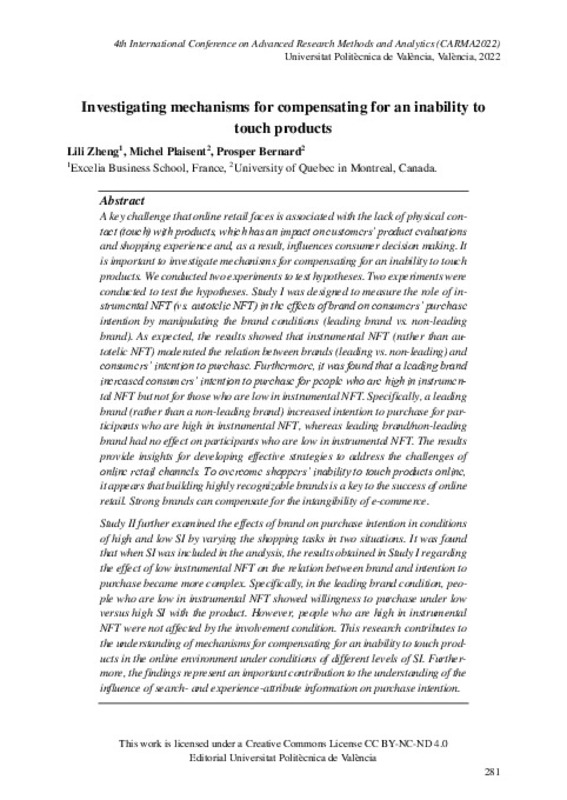JavaScript is disabled for your browser. Some features of this site may not work without it.
Buscar en RiuNet
Listar
Mi cuenta
Estadísticas
Ayuda RiuNet
Admin. UPV
Investigating mechanisms for compensating for an inability to touch products: the role of brand and situational involvement
Mostrar el registro sencillo del ítem
Ficheros en el ítem
| dc.contributor.author | Zheng, Lili
|
es_ES |
| dc.contributor.author | Plaisent, Michel
|
es_ES |
| dc.contributor.author | Bernard, Prosper
|
es_ES |
| dc.date.accessioned | 2022-11-14T12:55:33Z | |
| dc.date.available | 2022-11-14T12:55:33Z | |
| dc.date.issued | 2022-09-20 | |
| dc.identifier.isbn | 9788413960180 | |
| dc.identifier.uri | http://hdl.handle.net/10251/189701 | |
| dc.description.abstract | [EN] A key challenge that online retail faces is associated with the lack of physical contact (touch) with products, which has an impact on customers’ product evaluations and shopping experience and, as a result, influences consumer decision making. It is important to investigate mechanisms for compensating for an inability to touch products. We conducted two experiments to test hypotheses. Two experiments were conducted to test the hypotheses. Study I was designed to measure the role of instrumental NFT (vs. autotelic NFT) in the effects of brand on consumers’ purchase intention by manipulating the brand conditions (leading brand vs. non-leading brand). As expected, the results showed that instrumental NFT (rather than autotelic NFT) moderated the relation between brands (leading vs. non-leading) and consumers’ intention to purchase. Furthermore, it was found that a leading brand increased consumers’ intention to purchase for people who are high in instrumental NFT but not for those who are low in instrumental NFT. Specifically, a leading brand (rather than a non-leading brand) increased intention to purchase for participants who are high in instrumental NFT, whereas leading brand/non-leading brand had no effect on participants who are low in instrumental NFT. The results provide insights for developing effective strategies to address the challenges of online retail channels. To overcome shoppers’ inability to touch products online, it appears that building highly recognizable brands is a key to the success of online retail. Strong brands can compensate for the intangibility of e-commerce. Study II further examined the effects of brand on purchase intention in conditions of high and low SI by varying the shopping tasks in two situations. It was found that when SI was included in the analysis, the results obtained in Study I regarding the effect of low instrumental NFT on the relation between brand and intention to purchase became more complex. Specifically, in the leading brand condition, people who are low in instrumental NFT showed willingness to purchase under low versus high SI with the product. However, people who are high in instrumental NFT were not affected by the involvement condition. This research contributes to the understanding of mechanisms for compensating for an inability to touch products in the online environment under conditions of different levels of SI. Furthermore, the findings represent an important contribution to the understanding of the influence of search- and experience-attribute information on purchase intention. | es_ES |
| dc.format.extent | 1 | es_ES |
| dc.language | Inglés | es_ES |
| dc.publisher | Editorial Universitat Politècnica de València | es_ES |
| dc.relation.ispartof | 4th International Conference on Advanced Research Methods and Analytics (CARMA 2022) | |
| dc.rights | Reconocimiento - No comercial - Sin obra derivada (by-nc-nd) | es_ES |
| dc.title | Investigating mechanisms for compensating for an inability to touch products: the role of brand and situational involvement | es_ES |
| dc.type | Capítulo de libro | es_ES |
| dc.type | Comunicación en congreso | es_ES |
| dc.rights.accessRights | Abierto | es_ES |
| dc.description.bibliographicCitation | Zheng, L.; Plaisent, M.; Bernard, P. (2022). Investigating mechanisms for compensating for an inability to touch products: the role of brand and situational involvement. En 4th International Conference on Advanced Research Methods and Analytics (CARMA 2022). Editorial Universitat Politècnica de València. 281-281. http://hdl.handle.net/10251/189701 | es_ES |
| dc.description.accrualMethod | OCS | es_ES |
| dc.relation.conferencename | CARMA 2022 - 4th International Conference on Advanced Research Methods and Analytics | es_ES |
| dc.relation.conferencedate | Junio 29-Julio 01, 2022 | es_ES |
| dc.relation.conferenceplace | Valencia, España | |
| dc.relation.publisherversion | http://ocs.editorial.upv.es/index.php/CARMA/CARMA2022/paper/view/15027 | es_ES |
| dc.description.upvformatpinicio | 281 | es_ES |
| dc.description.upvformatpfin | 281 | es_ES |
| dc.type.version | info:eu-repo/semantics/publishedVersion | es_ES |
| dc.relation.pasarela | OCS\15027 | es_ES |






